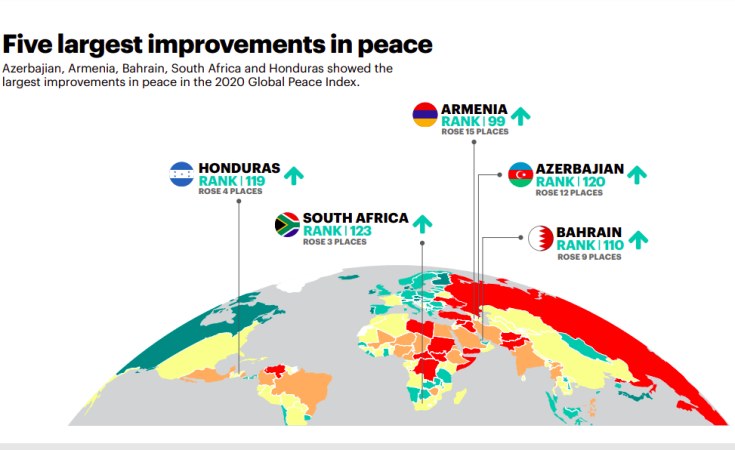Cape Town — South Africa, Cote d'Ivoire and Equatorial Guinea have become more peaceful in the past year, but the situations in Benin and Niger have deterioriated, according to the latest results of a survey which ranks nations for "peacefulness".
The Global Peace Index (GPI) for 2020 shows that although over the past decade the world has become more peaceful, it is on average less peaceful in 2020 than it was in 2019, and that, globally, peace has seen setbacks in nine of the past 12 years.
Results for sub-Saharan Africa mirror the global picture, with 20 countries becoming more peaceful in the past year but 24 deteriorating: "Disputes over election results and demands for political change have led to civil unrest and political instability in several countries across the region, with violent protests breaking out in many countries over the past year," the report issued with the index said.
The index is produced by the Australia-based Institute for Economics and Peace. It measures the peacefulness of a country using 23 indicators in three broad categories: conflict, including numbers of deaths and the duration of both internal and external conflicts; safety in a society, taking into account such factors as violent crimes or demonstrations, terrorism and political instability; and how militarised a society is, judged by military spending, the size of armies, arms trading and ease of access to small arms and light weapons.
The African country which ranks as the most peaceful is Mauritius
"The 2020 GPI reveals a world in which the conflicts and crises that emerged in the past decade have begun to abate, only to be replaced with a new wave of tension and uncertainty as a result of the COVID-19 pandemic," the survey says. "The COVID-19 pandemic will cause substantial changes in how society operates and business is conducted in most countries."
It adds that countries with low levels of public debt and governments which function well are more likely to recover relatively quickly from the crisis.
The African country which ranks as the most peaceful is Mauritius, at 23rd place among 163 countries surveyed. It is followed by Botswana, in 33rd place, Ghana, in 43rd place, Zambia (44th), Sierra Leone (46th) and Senegal (47th).
Five of the 10 least peaceful countries in the world are in Africa. South Sudan is worst off, at 160th place, followed by Somalia (158th), Libya (157th), the Democratic Republic of Congo (156th), and the Central African Republic (155th).
The survey highlights a dramatic increase in civil unrest across the world, but especially in sub-Saharan Africa, where it has risen nine-fold, from 32 riots and protests in 2011 to 292 in 2018. The region has the highest proportion of violent demonstrations, with riots constituting two in every five events.
"Nigeria accounted for the largest number of demonstrations and the largest increase," the survey says. "In 2018 the number of demonstrations rose from six to 79 in a single year. Perhaps the most prominent issue was the imprisonment of Sheikh Ibrahim El-Zakzaky, leader of the Islamic Movement of Nigeria."
Ethiopia has also experienced a dramatic rise in civil unrest
The survey report also highlighted conflict between the government and Boko Haram, increased militarisation and cross-border smuggling as contributing to Nigeria's challenges.
Although South Africa has become more peaceful overall, it saw an 86 percent increase in civil unrest between 2011 and 2018 and it still has high levels of violent crime, including murder.
"South Africa improved on several indicators in the militarisation domain," the report adds. "Its commitment to timely United Nations peacekeeping funding improved, and the number of both weapons imports and weapons exports fell. However, South Africa is still the largest weapons exporter per capita in the sub-Saharan region, and is ranked 30th for per capita weapons exports overall."
Ethiopia has also experienced a dramatic rise in civil unrest, with riots and protests rising 500 percent from 2015 to 2018, many occurring in Oromiya state.
Scanning Africa's worst-performing countries, the report says that despite South Sudan's poor record, it has made progress towards building the political foundations for peace, citing the settlement between President Salva Kiir and rival Riek Machar.
But Benin saw the biggest deterioration in the world in 2020 as a result of the clashes across the country following the April 2019 election. Niger, which experienced cross-border robberies, violent crime and "entrenched criminality", suffered the second-worst deterioration in peacefulness on the continent.
The authors of the report assert that it is the world's top measure of peacefulness. "This report presents the most comprehensive data-driven analysis to date on trends in peace, its economic value, and how to develop peaceful societies," they say.


